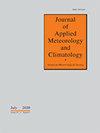半孤立地块缓坡上清晨过渡的特征
IF 2.2
3区 地球科学
Q3 METEOROLOGY & ATMOSPHERIC SCIENCES
引用次数: 0
摘要
本文研究了半孤立地块上与早晨从夜间下坡风到白天上坡风转变相关的表层过程。它深入了解了过渡的特征及其与控制坡脚逆温侵蚀过程的联系。首先,提出了一个识别易发生纯热驱动斜坡风的天数的标准,并选择了五个具有代表性的案例研究。然后,分析了导致坡脚夜间逆温不同侵蚀模式的机制。确定了三种主要的侵蚀模式:第一种与地表对流边界层的生长有关,第二种与逆温顶部的下降有关,第三种与前两者的结合有关。第一种模式与通过表面加热开始早晨过渡有关,而第二种模式与自上而下的稀释机制有关,从而与上述空气混合有关。确定侵蚀模式的判别因素是在表面湍流显热通量的划分中确定的。本文章由计算机程序翻译,如有差异,请以英文原文为准。
Characterization Of The Morning Transition Over The Gentle Slope Of A Semi-Isolated Massif
This paper investigates the surface layer processes associated with the morning transition from nighttime downslope winds to daytime upslope winds over a semi-isolated massif. It provides an insight into the characteristics of the transition and its connection with the processes controlling the erosion of the temperature inversion at the foot of the slope. First, a criterion for the identification of days prone to the development of purely thermally driven slope winds is proposed and adopted to select five representative case studies. Then, the mechanisms leading to different patterns of erosion of the nocturnal temperature inversion at the foot of the slope are analyzed. Three main patterns of erosion are identified: the first is connected to the growth of the convective boundary layer at the surface, the second to the descent of the inversion top, and the third to a combination of the previous two. The first pattern is linked to the initiation of the morning transition through surface heating, while the second pattern is connected to the top-down dilution mechanism and so to mixing with the above air. The discriminating factor in the determination of the erosion pattern is identified in the partitioning of turbulent sensible heat flux at the surface.
求助全文
通过发布文献求助,成功后即可免费获取论文全文。
去求助
来源期刊
CiteScore
5.10
自引率
6.70%
发文量
97
审稿时长
3 months
期刊介绍:
The Journal of Applied Meteorology and Climatology (JAMC) (ISSN: 1558-8424; eISSN: 1558-8432) publishes applied research on meteorology and climatology. Examples of meteorological research include topics such as weather modification, satellite meteorology, radar meteorology, boundary layer processes, physical meteorology, air pollution meteorology (including dispersion and chemical processes), agricultural and forest meteorology, mountain meteorology, and applied meteorological numerical models. Examples of climatological research include the use of climate information in impact assessments, dynamical and statistical downscaling, seasonal climate forecast applications and verification, climate risk and vulnerability, development of climate monitoring tools, and urban and local climates.

 求助内容:
求助内容: 应助结果提醒方式:
应助结果提醒方式:


